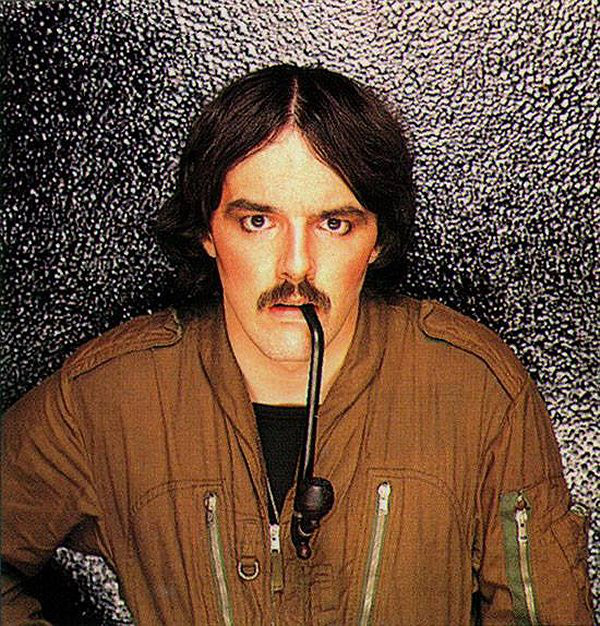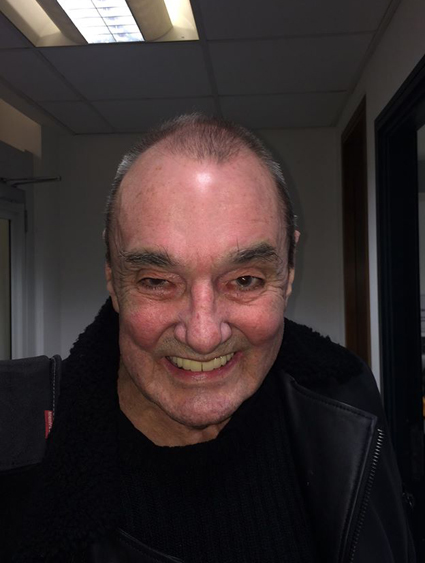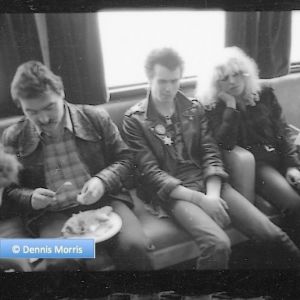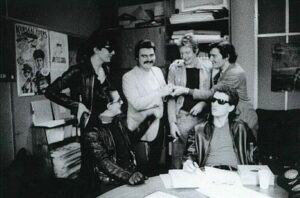RM) How fast did Punk spread throughout 1977?
Ron) Well, it got going in ’76. The Wycombe Punks, because they had me to promote at the Nags Head, got their first Sex Pistols gig there on September 3rd, which was actually 3 weeks before the 100 Club Festival. They were on the case really early. In ’76, Wycombe and the surrounding towns were full of Punks. By the end of that year, they even had a black Punk in Wycombe, a guy called Marmite. He had black hair, with a silver zigzag stripe in it. By ’77, it was all up and running everywhere. By January or February 1977 almost everyone under the age of 18 or 19 was a Punk.RM) When did the press really get hold of it?
Ron) Then. But they were on to it before the Bill Grundy Show, the Punk Festival was before that show and from then it was just….you know. I used to get phone calls, from NBC and CBS in America asking if anything’s going on, or coming off, could you let us know.
RM) That’s odd, being as the Americans claim to have invented Punk!
Ron) They were a year or two ahead. It’s like most things. It’s like the Blues. We had to take the Blues back to America for White America to know about it. Cream, Rolling Stones, Fleetwood Mac, those sort of people. RM) America’s too big and too diverse. It couldn’t host youth movements like Punk and 2-Tone.Ron) No. It had to come from somewhere else. I mean, in New York it was a club scene, in Britain it was a national scene. RM) What did you think of those American bands?Ron) Some of them were really good. I didn’t think New York Dolls were as good as bands like Johnny Thunders and the Heartbreakers. They were probably the best Punk band I ever saw, actually.
RM) And Blondie?
Ron) Well, Blondie. The bass player, Nigel was a guy from the Nags Head. Tigger, we used to call him. That was his name round Wycombe. He played at the Nags Head before he was in Blondie. I’ve got to say that Tigger and Blondie didn’t get on. Maybe she fancied him, and he didn’t fancy her!
RM) He would’ve been the only British male in the late ‘70’s who didn’t, then?!
Ron) Perhaps he knew something we didn’t!RM) Back to the serious stuff, Ron. The Clash flew to Belfast, had some nice photos taken near some barricades and murals. Then they flew home. No gigs played. What do you think about all that?
Ron) Well, it’s up to them. Sometimes, promotional events can take over. You can be wise after the event, it might have sounded like a good thing at the time. Who knows, I mean, it might have been sincere. I didn’t see them as a band who had very political motives outside of the publicity. I’m not saying they didn’t have a heart, but sometimes publicity sows a life of its own, you know.RM) If they’d played, this would never have been an issue with people over the years.
Ron) No, but they would do benefits and things, R.A.R, and one just before Joe died, for a fireman’s benefit. RM) It’s ironic. The Pistols and Strummer/Jones last gigs in England were both strike fund benefits. And the Pistols, apparently, never cashed their cheque from that Christmas Day one.
Ron) I wasn’t a party to any of that, but yeah, that was a good gesture. A lesson. A guy came down to interview me, and he lived near Joe Strummer. Lived in the same village and he was a long time journalist. He said that he thought that Joe Strummer had a lot of heart, and it was very typical of him that he’d go out and do a benefit as The Clash, but commercially would only do The Mescalero’s.
RM) Back to the Pistols, now Ron. What was their early live sound like?
Ron) I’ll tell you something now that I’ve never told anybody before. Musically, when the Pistols started, I thought that they were, or sounded like, a youth club heavy metal band. Not the songs, or the vocals, or even the presentation but the actual sound of the band. It wasn’t a weak sound, but it wasn’t particularly pokey. Within three months, they’d perked it up a lot.
RM) How big an influence was Dave Goodman to their sound?
Ron) He brought a lot of stuff to them. He gave them a lot of advice. He’d make them sound a lot more pokey, he’d get them to do things. I spent a lot of time with Dave Goodman, as when you’re a promoter, you’re there to open it up. And Dave used to arrive early, you know, he’d arrive at four in the afternoon. I’d give him a hand in with some of the gear, and we’d spend some time together as we’d be the only ones there for a couple of hours. I’d be answering the phone and stuff, doing other things like that, but I got to know that guy. He never actually spoke to me about Punk. He mentioned the Pistols, but he never actually spoke about the Punk movement. I wish I’d recorded all those conversations!RM) Did you always fill the 100 Club?
Ron) Well, after the first couple of months, it filled out, yeah. I mean, the Pistols didn’t pull a crowd for about their first six gigs. We’re talking about 50 – 80 people, the Bromley Contingent and a few interested parties!
RM) Some people must’ve come in to watch the Pistols out of curiosity? Maybe just walking by the club, then deciding to see what was going on in there, and finding their lives would never be quite the same again?
Ron) Yeah, I think that younger people who come down to see it would change. They’d come down the first night with long hair and flares, and by the third night they’d seen them they’d come down in drainpipes and Punk haircut, you know?
RM) What about the other clubs, Ron, like the Roxy?
Ron) Went to the Roxy, yes, many times. It was a bit of a pokey hole actually. The Roxy didn’t last long. The Vortex I went to. The stories I used to hear about that place! It was more of a disco crowd, actually. Rent-a-Punk, you know? It wasn’t for the faint hearted, not very savoury! RM) Did you get to read many of the fanzines?
Ron) Yeah, I did. I used to see them all. We had one out in the Home Counties called the Buckshee Press, which is a piss take of the Bucks Free Press, of course there was Sniffin’ Glue, we used to see that at the 100 Club all the time. There were others, too, I came across them all over the place, actually, some of them were just one issue, you know, and just a couple of pages.RM) Did you know Mark Perry and the music hacks the time?
Ron) Yeah, I knew Mark. Caroline Coon, too. Caroline has been very kind to me in her books, and things, you know. In fact she blamed me, or congratulated me for the whole of Punk in one of them, special thanks to Ron Watts, and that’s nice! Caroline was the first dedicated journalist who wanted to see Punk happen. And, I’m glad in a way that it happened for her, too, because she put her money on the table, you know? Same as I did. She ran that Release thing, which got all the hippies out of jail for cannabis. She was ahead of her time, I mean seriously, you can’t lock someone up for 6 months for smoking cannabis! RM) Changing tack again, Ron. What did you think of Malcolm Mclaren?
Ron) I like Malcolm personally. No doubt, you know, I’m not just saying that. On first impressions he looked like an Edwardian gentleman. He’d got that off to a tee, I’d never seen anyone look like him, actually. I never had any bad dealings with him, and he was always very straightforward.RM) People either loved or loathed Mclaren. John Lydon isn’t a fan.
Ron) Yeah, I think it was more of a financial thing, but I mean, John Lydon should also remember that without Mclaren he probably wouldn’t have been in them. Mclaren set the scene going, I was the first to pick it up, from that, before recording deals, but he never stuffed me like he stuffed the record companies. They made a lot of money, initially.RM) Did the record companies drop the band so willingly because it was Jubilee year?
Ron) Well, the Pistols were full on and did it. I mean, “God Save The Queen” become one of the biggest selling British hit singles, didn’t it? It’s still selling now! And they wouldn’t let it on the shelves, would they. Bless ‘em! RM) You were on the legendary ’77 boat trip up the Thames, when the Pistols played and Mclaren got arrested. What was that like?
Ron) It was lovely! You should’ve been there, honestly. The band were ok, they just did their normal gig. I enjoyed seeing people that you wouldn’t expect, talking to each other. When you’ve got the boss of Virgin, that business empire, talking to Sid Vicious, can you imagine what sort of conversation they had?! I’d loved to have taken a tape recorder in there! RM) Do you think the police raid on the boat was planned?
Ron) I tell you what, I was amazed at that. I was actually on deck, and the boat was going downstream, back towards Westminster Pier. The Pistols were playing, and it got a bit jostley. You know, a bit of charging about in a small space ‘cause it wasn’t very big, the boat, really. So, I went out on to the deck by the railings, and a couple of other people come and joined me. There was plenty of food and drink, and I had a beer and a chicken leg or something, you know. And I’m looking and I can see these two police boats, and they were a way off. Downstream, I could see two more police boats, and they were a way off, too. I carried on eating the chicken and drinking the beer, looked round, and they were all there, together, at the same time! I mean, the degree of professionalism was just amazing! And then they were on that boat, in force, like about twelve or fifteen coppers, in moments. The boat was quite high sided, but they were up there. And you know what they were doing, they were up there and on that boat and we were escorted into the Westminster Pier basin.RM) Then Mclaren was nicked. Do you reckon he did just enough to get the publicity of an arrest without being charged with anything serious?
Ron) I saw that. He got a lot of press out of it, yeah. He knew. Everybody turned to me, to try and sort it all out. One of them was a Countess!
RM) Ron, you mentioned that no other bands were on the boat. Was there a real rivalry between these new bands at the time?
Ron) The Jam were the young upstarts according to the Pistols, you know. The Clash were their biggest rivals at the time. The Damned, they had no time for.RM) Why don’t The Damned get their due credit? In my opinion, they should.
Ron) I don’t know. A lot of people say they’re just a Punk cocktail act. You don’t see a lot about them, and yet they were the first to get a single out and they could play. Scabies could play. Brian James come up brilliant, but then he’d have done anything, if they’d have asked him to join Led Zeppelin he’d have done that, and Captain (Sensible), well I like Captain.RM) Buzzcocks were, from what I’ve heard on bootlegs, a bit rough to start with. They really hit a rich seam once they got up and running.
Ron) If the Buzzcocks could make it, anybody could. I wasn’t impressed, really. But what’s in the future’s in the future, you never know what is at the time. They blossomed.
RM) And Magazine? Did you rate them?
Ron) Yeah, I did. Brilliant guitarist, John McGeoch. And Penetration, they were a good band, and X-Ray Spex.
RM) Which bands are you the most pleased to have seen play?
Ron) Well, I mean, it’s all of them. But where do you start?! Alright, the Pistols and The Clash, definitely, yeah. The Jam – pleased to see them anywhere, anytime. I did enjoy the Damned at an early stage, but they’re not in the top 5. And Sham 69, and The Heartbreakers.RM) I heard “Pretty Vacant” on the radio in my car earlier today, and I got the old goose bumps. Does any of the music from that time affect you the same?
Ron) All the early Pistols stuff, yeah!RM) What’s your view on Punk and Reggae getting married?
Ron) Yeah, if people want to get together and cross pollinate ideas, then that’s alright. It was the underbelly, twice. You had the white working class and the black working class responding to each other at last! RM) Some Punk bands who had a go at playing Reggae were better than others. Ruts, SLF and of course The Clash all cracked it in their own styles…
Ron) The worst Reggae act I ever saw, were The Slits. Actually, probably just the worst act! RM) Do you think that Punk and Reggae blending in ’77 was the root of Two Tone?
Ron) Yes. I’m sure it came out of that. I used to have a lot of Reggae acts on in that club, aside from Punk and the Blues and everything. I’d put on Steele Pulse, or an American Blues artist like Muddy Waters, as long as it was what I liked.
RM) Your best front men and women?
Ron) I’m thinking about this one…The best oddball front man was Wayne County. Best front woman, from what I saw, Faye Fife.RM) You rate Faye Fife over Poly Styrene?Ron) You’re putting me on the spot there! I’d put them equal for different reasons. Faye used to put on a great act. They were perennially at the club and at the Nags Head. Because I had so many venues, when they were coming down again, I needed to know, because that’s three bookings to give them. It was always like, “get your diary out, mate, when you coming down?” If I gave them three bookings, they’d come down, and they could fill it out with other stuff, do the rounds. X-Ray Spex were good, too. Really good band. The Rezillos are still going, actually. RM) I watched a documentary on TV the other night about that Stiff Records tour. The one where they hired a train from BR.
Ron) They did the first night for me, at High Wycombe, yeah. There were some funny people there! Wreckless Eric was at the Punk thing I did in Blackpool this year. It took me about an hour to recognise him. I kept looking and looking and vaguely remembered him. Not a nice bloke. RM) Here’s the last one, Ron. Punk lit a fuse for many people. I’m one (albeit two years late), the other people who contributed questions to this interview are others and there’s millions more. As Ed Armchair puts it, his fuse is still burning to this day, and has affected virtually every aspect of his life since it was lit. Do you have the same feelings about Punk as we do?
Ron) Yes. I got going through that and it still survives. My first love in music was, and is, Blues. I see a lot of similarities between Punk and Blues. They both come from the underbelly of a society, and they’ve both triumphed against all the odds. They both spoke for their people of that time and place. They’ll reverberate forever. Punk freshened up a stale music scene and the Blues were the bedrock for twentieth and twenty-first century music.RM) Ron, thanks for your time and best of luck with your new projects.END |




